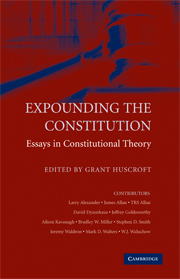Book contents
- Frontmatter
- Contents
- Preface
- Contributors
- Introduction
- PART I MORALITY AND THE ENTERPRISE OF INTERPRETATION
- PART II JUDICIAL REVIEW, LEGITIMACY, AND JUSTIFICATION
- 5 Constitutions, Judicial Review, Moral Rights, and Democracy: Disentangling the Issues
- 6 The Incoherence of Constitutional Positivism
- 7 The Travails of Justice Waldron
- 8 Deference or Defiance? The Limits of the Judicial Role in Constitutional Adjudication
- PART III WRITTEN AND UNWRITTEN CONSTITUTIONAL PRINCIPLES
- Index
6 - The Incoherence of Constitutional Positivism
Published online by Cambridge University Press: 25 July 2009
- Frontmatter
- Contents
- Preface
- Contributors
- Introduction
- PART I MORALITY AND THE ENTERPRISE OF INTERPRETATION
- PART II JUDICIAL REVIEW, LEGITIMACY, AND JUSTIFICATION
- 5 Constitutions, Judicial Review, Moral Rights, and Democracy: Disentangling the Issues
- 6 The Incoherence of Constitutional Positivism
- 7 The Travails of Justice Waldron
- 8 Deference or Defiance? The Limits of the Judicial Role in Constitutional Adjudication
- PART III WRITTEN AND UNWRITTEN CONSTITUTIONAL PRINCIPLES
- Index
Summary
“[Positivism's ideal] is, I suspect … rather futile … the only effective technique for reducing the common law to a set of rules is codification, coupled of course with a deliberate reduction in the status of the judiciary and some sort of ban on law reporting. But to portray the common law as actually conforming to this ideal is to confuse the aspirations of those who are attempting to arrest the collapse of a degenerate system of customary law with the reality.”
A. W. B. SimpsonINTRODUCTION
The term constitutional positivism refers to a family of positions in legal and political theory, many of which are influential in contemporary debates. Members of this family include critics of judicial activism and academics who advocate an enhanced role for legislatures in constitutional interpretation and a diminished role for judges. They tend to see originalism, the idea that there is some original, factually determinable meaning of the constitution that it is the judicial duty to transmit to legal subjects, as a way of disciplining judges in order to confine their activism and diminish their role in legal order.
It is important at the outset to appreciate that constitutional positivism, although a member of the positivist tradition, has a rather complex relationship with it. Traditionally, positivism is hostile to judicial review for political reasons to do with ensuring that the law is made by the legislature, because it is in the legislature that collective judgments about the common good are most appropriately made.
- Type
- Chapter
- Information
- Expounding the ConstitutionEssays in Constitutional Theory, pp. 138 - 160Publisher: Cambridge University PressPrint publication year: 2008
- 1
- Cited by



